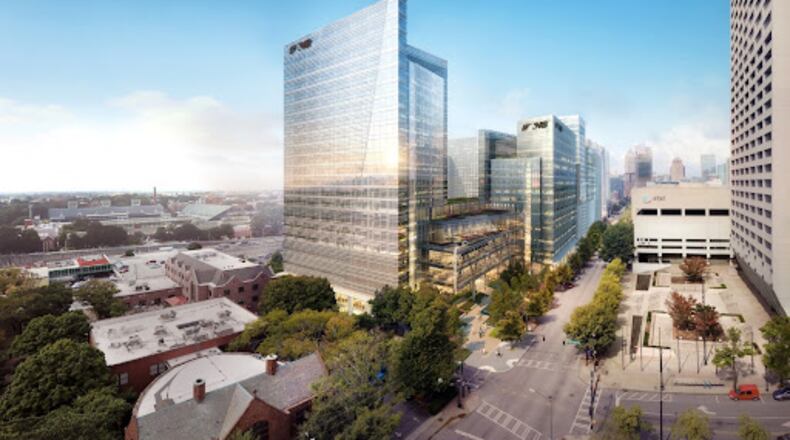The grand opening of the gleaming Norfolk Southern headquarters in Midtown Atlanta on Wednesday might as well have been a symbol of strong city-state relations. But it also heralded questions about the future of the region’s leadership ahead of a mayoral runoff and a volatile 2022 election.
A landmark alliance between the Gold Dome and Atlanta City Hall in late 2018 laid the tracks to snag the railroad giant and also forged a controversial publicly financed framework to build a mini-city atop downtown’s long-forgotten Gulch.
Then-Gov. Nathan Deal and Mayor Keisha Lance Bottoms formally announced in December 2018 the complex deal that lured Norfolk Southern from its Virginia headquarters to a prime site in Midtown, a project that took years of negotiations and cooperation between city and state leaders.
At Wednesday’s ceremony, Gov. Brian Kemp touted the statewide impact of Norfolk Southern’s relocation to Atlanta, which will also involve training facilities and distribution facilities scattered throughout Georgia.
And Bottoms highlighted the economic afterglow the $575 million project will bring to the city, starting with 850 jobs and new corporate leaders who intend to invest in Atlanta’s civic community. The painstaking discussions that yielded the development, she added, were worth the political capital.
“I’m also reminded of the words of Nelson Mandela: ‘It always seems impossible until it’s done,’ ” Bottoms said. “This was not easy.”
But in the twilight of 2021, the status of city-state relations is mired in a decidedly different dynamic. Kemp and Bottoms have engaged in a simmering dispute over the coronavirus pandemic, law-and-order policies and broader political issues that their predecessors avoided.
Credit: Alyssa Pointer / AJC file photo
Credit: Alyssa Pointer / AJC file photo
Headed into an election year, Kemp and other Republicans have left the door open to a legislative push to allow the residents of Buckhead to split from Atlanta and create a new city, despite staunch opposition from Democrats and corporate leaders.
Bottoms is not running for reelection, and the next mayor will inherit a menu of other problems that complicate the city’s ties to the state’s GOP establishment, including how to curb rising crime rates and new efforts by the state to take control of Hartsfield-Jackson International Airport’s management.
City Council President Felicia Moore and Councilman Andre Dickens, who square off in a Nov. 30 runoff, have both pledged to repair the strained relationship with the Gold Dome while also remaining fiercely protective of the city.
At stake are coveted economic development prizes and big federal projects that are easier to win if leaders are on the same page, along with a chance for a more unified approach to challenges ranging from the pandemic to severe weather crises.
Growing the Gulch
The Norfolk Southern deal, arguably the most complex corporate relocation in Atlanta in the past decade, seemed born in a different era.
It started in the mid-2010s when the city, state and developer CIM Group began discussing a plot of land owned by the railroad smack in the middle of the Gulch, the unsightly 40-plus-acre hole of parking lots and rail lines wedged between Mercedes-Benz Stadium and the Five Points MARTA station.
Those talks soon morphed into a chance for Georgia to win the home office of one of the nation’s biggest railways. Norfolk Southern eventually agreed to move to a site in Midtown — but it needed to sell the Gulch land first.
It was no easy pitch. Though the land is envisioned as the center of a $5 billion redevelopment that will house slender skyscrapers, posh retail outlets and dense residential developments, it was a barren tangle of dirt and parking lots crisscrossed by rail lines.
To create the 12 to 15 city blocks CIM wants to build, the company aims to construct a $700 million platform to raise the development site 40 feet to the level of surrounding streets and to preserve space for trains to operate underneath.
Credit: JOHN SPINK / AJC
Credit: JOHN SPINK / AJC
Before CIM would buy Norfolk Southern’s land, the California-based developer wanted the city and state to forgo decades of future sales and property taxes to help fund the project and costly infrastructure. The public tab could be valued at a potential $1.9 billion in future sales and property taxes, not including interest.
Georgia lawmakers approved the state’s piece of those changes in 2017 with little debate. But winning the approval of city councilmembers for the largest public incentive package ever awarded by the city took an all-out lobbying effort.
Opposition groups quickly sprang up, saying the deal amounts to a “welfare check” to a powerful corporation. Community leaders and some councilmembers complained about a lack of transparency. The initial plan seemed headed for defeat, forcing supporters to overhaul the proposal.
Flip-flop diplomacy
To get the City Council’s sign-off, Deal and Bottoms both ratcheted up the pressure.
In public, Deal took the rare move of wading into city politics. He urged city councilmembers to approve the Gulch project and turn the forlorn land into a “revenue producer rather than just a hole in the ground” — not least because the state owns a giant chunk of the sprawling property.
In private, administration officials pressed for changes. Deal’s top aide, Chris Riley, met with city councilmembers to detail the state’s investment in the project — and warn that failing to approve of the changes could jeopardize Norfolk Southern’s relocation.
One meeting was so hastily arranged that Riley showed up at City Hall after a workout in flip-flops and an Atlanta Hawks T-shirt to join Bottoms to discuss the deal with three wavering city legislators.
In another rare move, the Deal administration dispatched Bert Brantley, then a top state economic development official, to an hourslong listening session on the Gulch to answer any questions from residents and politicians about the deal’s impact.
After months of intense debate, the City Council narrowly agreed in November 2018 to support the potential 10-figure public financing package. The vote took place on the eve of a divisive gubernatorial election that Kemp won after warring with Bottoms on the campaign trail.
‘Exciting times’
Though Kemp initially sought to defuse tensions with Bottoms, their partnership remains icy at best.
This month’s mayoral runoff could provide a chance to reset the dynamic, though many political insiders consider that unlikely in this political environment, as GOP leaders have increasingly made Atlanta into a favorite target to energize supporters in other parts of the state.
Credit: DBOX for Centennial Yards
Credit: DBOX for Centennial Yards
City boosters say the twin projects yielded by the 2018 pact, meanwhile, stand as a testament to the benefits of the close ties.
Norfolk Southern officials on Wednesday boasted of the amenities of the new corporate headquarters, including high-tech conference rooms, a top-notch fitness center and sprawling floor plans designed for socially distanced working.
And the Gulch redevelopment is slowly taking shape, though the entire complex will take years to complete. Last month, Bottoms and CIM officials celebrated the public benefits negotiated as part of the deal, including $28 million to an affordable housing trust fund.
This week, Centennial Yards, a subsidiary of CIM, marked the construction of a new pedestrian bridge to replace a crumbling structure that connected Castleberry Hill to downtown, part of the infrastructure package negotiated with developers.
And a historic former Norfolk Southern office building has been converted into loft apartments, bringing residents and economic activity into a forlorn part of the city. Brian McGowan, who heads Centennial Yards said Wednesday on Twitter that the new bridge was just the start.
“Exciting times ahead,” he said.
The Latest
Featured







